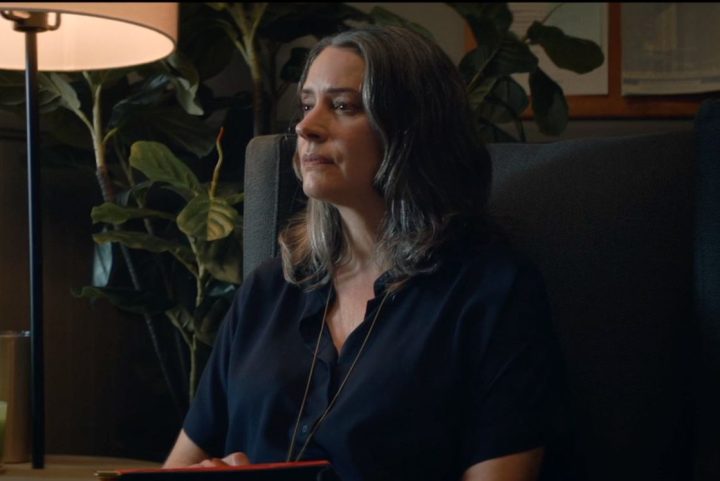Paget Brewster is no stranger to television. The veteran actor played the memorable role of Kathy on the fourth season of Friends before becoming a series regular on Criminal Minds as Emily Prentiss, a role in which he appeared for almost 200 episodes. Now, Brewster is switching mediums in her latest film, Hypochondriac, a horror film exploring the trauma of a man named Will (Zach Villa) experiencing a mental breakdown.
In Hypochondriac, Brewster plays Dr. Sampson, a medical professional who attempts to help Will cope with his mental illness, but it’s met with mixed results. Brewster sat down with Digital Trends to discuss her role in Hypochondriac, the appeal of working with Zach Villa, and why she’s excited to return for the Criminal Minds revival.

Note: This interview has been edited for length and clarity.
Digital Trends: Hypochondriac is based on the mental breakdown experienced by director Addison Heimann. How were you first approached for this part, and what stood out to you while reading the script?
Paget Brewster: Well, I had done a movie called Welcome to Happiness with the producer, Bay Dariz. So he just emailed me saying, “Hey. I’m working on a film, and we want you to take a look at the part of Dr. Sampson. I’m going to send the script over.” It was right in the middle of COVID, and I did not want to leave the house. I just was like, “Oh no. Indie film, no money. We’re going to shoot in some weird warehouse.” I was kind of hoping the script would be terrible, and I could say no, but it was great. It was great, and I hadn’t read anything like it before.
I was a huge Zach Villa fan from American Horror Story, and I just think that the guy is really unique and talented. So there was no way to say no. I was like, “Ah!” I yelled at Bay a little bit like, “You son of a bitch. You’re going to make me leave this house when everyone’s washing their vegetables with vinegar and had no idea what was going on. You’re gonna make me go out there? Ah! love it. I’m going to do it.” It was great. It was a great experience, and nothing felt reckless or frantic. It just ended up being a really, really beautiful experience.
In the film, you play a small, but very pivotal role as a doctor. When you’re preparing for a smaller role where you’re not going to spend that much time on set, does your preparation change compared to working as the star or a series regular?
That’s an interesting question. No, I do not believe my process changes. I know my lines. I’m always early. Being a smaller part or if I’m guest starring on other people’s shows, I just stay quiet because I know they have to do most of the heavy lifting. I don’t want to pepper them with questions or get in their way; I just want to support the people who are there. And so knowing the mental and emotional gymnastics that Zach had to go through day after day, just telling this story, that’s agonizing. That kind of acting role, I wouldn’t say yes to that. No matter how good, I wouldn’t do it. Mentally, I just don’t think I could handle it. A month or two of that, it doesn’t appeal to me.
I just wanted to support him [Zach] and do what I could. He was so welcoming and nice and he wasn’t off hiding, listening to his iPod, internalizing anything. I think he’s the first actor I have ever met who went to Juilliard [laughing] that they didn’t tell me that within the first five minutes. I didn’t know for months that Zach had gone to Juilliard. Usually, Juilliard and Harvard, people who go to those, you know, they tell you right away. I just think he’s so amazing. I really like him, and he was such a pleasure to work with. I hope I get to work with him again anywhere on anything. I just think he’s a dream.
I didn’t know that about Juilliard.
Don’t you feel like they say it right away [laughing]?
For sure. Harvard, too.
Well, they let you know right away [laughing]. Juilliard is the thing. I don’t think the Royal Academy of Dramatic Art, the British version of Juilliard, they don’t necessarily tell you right away they went to RADA. But Juilliard people let you know right away. But it’s impressive! I mean I didn’t get into Juilliard. It is impressive. They did do a hard thing.
Hypochondriac has a lot to say about mental illness and healthcare in this country. What do you think people want to take away from the film about those ideas?
It’s hard to answer that because I think the thing that I found so moving about it, I don’t want to give away the ending or what I thought the ending meant, but I think what’s really interesting about this is its horror on several levels. It’s the horror of not being able to get help from the medical community; It’s horror from the destruction of his relationships, job, and self, and the horror of his childhood, and the horror of the Wolf. There are just a bunch of different levels of horror.
But I think the takeaway is that it is okay to say you need help. It is okay to seek help. At a certain point, we need to find a way to live with our damage. If this is a component of my persona, of who I am, how do I incorporate it in a way that allows me to make the best choices and live as mentally healthy a life as I can, knowing that we all have insecurities or frailties or damage or trauma?
I think I had never seen anything like that in a script or in a movie. I don’t even think I fully understood the story. I read the script and loved it, but it wasn’t until I saw the movie that I really understood all of the levels of the movie and what it was saying that I thought was so beautiful. But also, it is a scary, creepy, movie. It’s just a lot, and I’m so proud to be a part of it.
Congratulations on the Criminal Minds revival at Paramount+. What are you looking forward to most about returning to your character?
I miss those guys. It’s a great job. We thought it was over. We did seasons 14 and 15. We shot [the seasons] in one year, and they were separated; 10 episodes aired in 2019 and 10 episodes in 2020. When the pandemic hit, we almost immediately heard the idea that Paramount+ might want to do Criminal Minds. We all got on Zoom and were like, “Would you do it? Would you do it? Would you do it?” Everyone was like “Hell yeah. I’ll do it!”
It’s so rare that you get to do a show that lasts that long, but now, because it was on Netflix, so many generations love it and it feels good to make people happy. We’re really excited, and we had enough time away from doing it to appreciate it. In a way, doing a procedural, you can get really run down. You’re just like “I’ve been 15 hours, five days a week, ten months a year.” Now, we spend too much time at home, and we’re raring to go back.
Hypochondriac is in theaters now, and on demand and digital on August 4.



